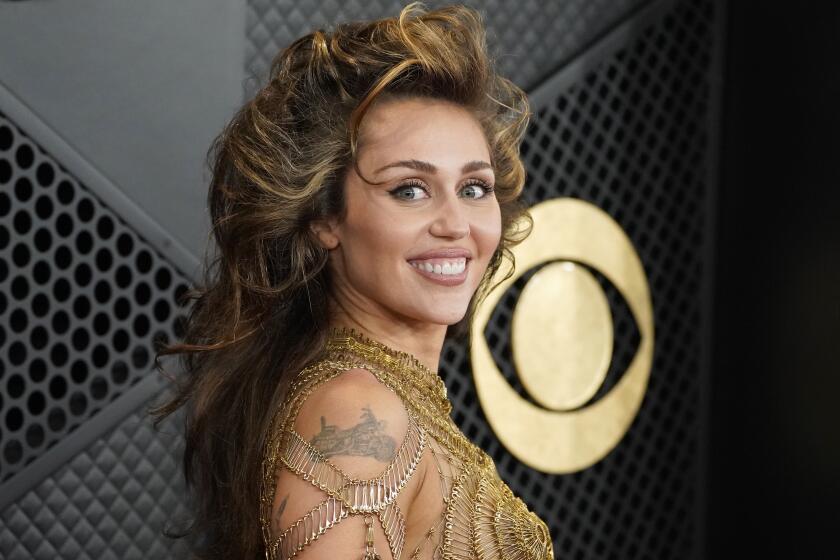Peter Gabriel’s Globalpalooza : Womad’s Musically Diverse Festival Finally Reaches the United States
Given its eclectic nature and adventurous spirit, it would seem that no musical or cultural frontiers would remain for Womad--the World of Music Art and Dance organization.
Founded in 1980 by pop star Peter Gabriel, Womad has presented musicians from all parts of the globe since 1982 in festivals from England to Australia to Finland to Yokahama.
But throughout Womad’s existence, one exotic land remained virtually untouched: the United States.
“There were a couple of attempts to bring it to the U.S.,” Gabriel said. “A few years ago Ry Cooder was going to headline a tour here for us, but it fell apart at the last minute.”
But Womad is finally here. The mix of international acts--ranging from pop (Crowded House), American hip-hop (PM Dawn) and reggae (Ziggy Marley) to modern Indian singing (Sheila Chandra), primal African percussion (the Drummers of Burundi) and Russian folk music (the Terem Quartet)--began its 10-city U.S. tour last week. And during Gabriel’s set, Sinead O’Connor sings on a few of his songs and some of her own. The tour has unexpectedly become the format for the re-emergence of O’Connor, who was booed off the stage during her last U.S. appearance at the Bob Dylan tribute last October in New York.
The tour comes to the Cal State Dominguez Hills Festival Field on Saturday, with the first act, Chandra, going on stage at noon. In addition to more than 10 hours of music on two stages, Womad features music, dance and crafts workshops and an area called “Futurezone” devoted to new applications of technology in arts and entertainment, such as virtual reality.
What took it so long to get here?
“It was a combination of things,” Gabriel said just prior to the U.S. invasion. “There is more ‘world music,’ as it is known, here than in other countries, yet it’s more segregated than in any other country I can think of. There is a state here which (Ugandan musician) Geoffrey Oryema calls musical apartheid.”
Ultimately, it took two things to break through. One was Gabriel’s agreeing to headline the tour: His drawing power makes it possible to mount the ambitious trek. The other was the success of the “Lollapalooza” tours--ironic in that the organizers of that alternative-rock festival were in part inspired by the Womad format.
“Certainly ‘Lollapalooza’ proved to promoters and so on that touring festivals can work as a concept,” said Gabriel, who remains a key--and certainly the most well-known--member of the organization, although he hasn’t been directly involved in its day-to-day operations since early on.
Gabriel had even been approached about headlining “Lollapalooza” this last summer and bringing along a few Womad artists. But he decided to do his own tour and then mount a full Womad excursion instead.
The question now is whether the Womad concept will work in the United States. In this “segregated” culture, where pop music fans usually stick to their favored styles and the term world music usually means ethnic roots music, Womad offers a full spectrum.
“New Zealand is part of the world,” said Neil Finn, the New Zealander who fronts Crowded House, which also played at the 1992 Womadelaide festival in Adelaide, Australia. “We’re not ‘world music’ in the sense of being ethnic or making indigenous music. But Womad is about pointing out the varieties and depths and extremes in music. And there’s certainly a place for pop music in that.”
At the same time, Finn said, it allows fans and musicians alike to see how different music styles relate to each other.
“There’s a lot of exchange between musicians,” he said. “It’s nice to be in such an un-ego-laden environment.”
For Chandra, that environment has provided essential support in what is not just her first-ever U.S. appearances, but among her first concerts anywhere. The England-based singer had kept her gorgeous, haunting, cross-cultural experiments studio-bound before doing Womad shows in England last year. Her latest album, “Weaving My Ancestral Voices,” was released on Gabriel’s ethnic-oriented Real World label.
“All sorts of interesting conversations and insights come up among Womad artists,” she said. “It’s a very friendly atmosphere because we all feel very well taken care of. It’s a great place to be.”
The U.S. shows aren’t quite on the level of Womad’s other festivals, which have mostly been two- or three-day affairs. Gabriel calls this the “come taste it” tour, meant as an introduction with hopes of longer stays in some U.S. cities in the future. “There is a sense of community that develops on the road,” he said. “A lot of unorthodox collaborations happen. And cities sometimes turn it into ‘Womad Day’ and open up city centers and we have stages in city squares. It has a medieval village sense, but with a world flavor.”
More to Read
The biggest entertainment stories
Get our big stories about Hollywood, film, television, music, arts, culture and more right in your inbox as soon as they publish.
You may occasionally receive promotional content from the Los Angeles Times.










